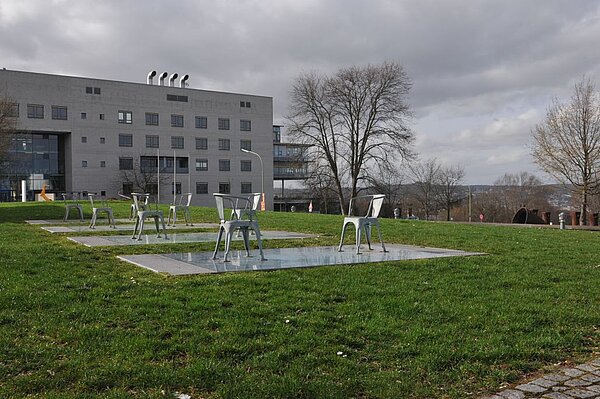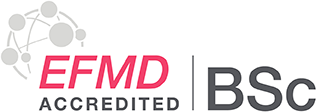Business Administration / Media Management and Digital Media

In this Bachelor’s program, we combine the three areas of media, markets and consumers. The constant change of (digital) media, the associated technologies and the media usage behavior of the target groups challenges both media enterprises and companies. In our study program Media Management and Digital Media, we prepare you for the specifics and management of today’s mostly digital media with the help of best-practice cases and relevant theoretical foundations.
At a glance
Prerequisites
The entry requirement is a higher education entrance qualification. Good English language skills are essential. Non-native speakers must prove sufficient knowledge of German.
Contact
If you have further questions regarding our study program or the application procedure, please do not hesitate to contact us:
mmdm(at)hs-pforzheim(dot)de
Program
In our study program we provide you with skills to develop strategies and products in a targeted manner, to select suitable media and to optimally design communication and interaction with consumers. Psychology courses will help you to explore the experience and behavior of consumers. You will learn how people make purchasing decisions, what is important to them when consuming media and products, and how advertising can lead to positive outcomes. The specialization comprises about 30% of the course content. The underlying business studies, which make up approximately 70%, create a sound foundation and prepare you optimally for the start of your career.
Benefits
You join Pforzheim University for an excellent academic education combined with practice-oriented focus and application in the field of Media Management and Digital Media. You will benefit from competent professors and professionals from the field, guest lectures, business projects, student excursions to (media) companies and agencies, small classes in the specialization courses, a variety of suitable student initiatives and a lot more. An internship semester is embedded in the curriculum as well as a study semester abroad at one of our numerous partner universities around the world.
You can start your professional career on the corporate side, in media enterprises or even agencies. A career in various management positions is open to you, including in the areas of social media, digital marketing, content marketing, influencer marketing, project management, product Management, communications or user experience.
The following content is taught in the major (30% of the course content):
- Media and Media Economics
- (Digital) Media Management
- Current Topics in the Media Industry,
- (Digital) Marketing
- Marketing Communication/Advertising
- Law in Marketing
- Trainings in Media and Communication
- Psychology of Advertising and Consumer Psychology
- Empirical Research Methods
- Electives in the field of (digital) media & marketing and psychology of advertising
- Business projects
- Internship semester
- Mandatory semester abroad
70% of the course content comprises the general study of business administration.
A strong practical orientation is indispensable in the teaching of the course content, especially in this study program. Thus, competent professionals from renowned companies and the media industry are recruited as lecturers and speakers in order to deepen particularly practice-relevant and current topics. In addition to the pure transfer of knowledge in the form of classical lectures, the practical application of the acquired knowledge is of great importance. This is ensured by real project work for business, case studies and field trips to companies, media houses and agencies. Within the framework of student initiatives such as Werbeliebe, you can put your knowledge into practice. Last but not least, the numerous connections to partner universities abroad offer you an excellent opportunity to broaden your horizon through the mandatory semester abroad. The international accreditation by AACSB and EFMD gives you the access to excellent universities abroad.
Program goals describe the competencies, which every student should have obtained at the end of their studies at Pforzheim Business School. Each one of these goals is outlined by learning outcomes, through which the competency goals are operationalized and become tangible.
You can find the program goals and learning outcomes of the various study programs in the navigation bar.
Goal at degree program level
Students have broad knowledge of theories and their practical application in order to understand business functions and processes. Expert Knowledge
Learning Objective/Outcome
1.1 Students demonstrate their distinguished and sound competencies in General Business Administration.
1.2 Students demonstrate their distinguished and sound competencies in Economics.
1.3 Students have command of legal methodology for case solutions on basis of claims.
1.4 Students are able to solve business problems based on profound data research skills and by applying quantitative methods.
1.5 Students have profound expert knowledge in their field of specialization.
Goal at degree program level
Students are able to use information technology successfully. Digital Skills
Learning Objective/Outcome
2.1 Students know and understand relevant IT software tools used in business and their features and have a solid understanding of digital technologies.
2.2 Students are able to effectively use and apply information systems to develop solutions in business settings.
2.3 Students are able to effectively use digital technologies to interact, to collaborate and to communicate.
2.4 Students handle the professional use of digital technologies in a responsible manner.
Goal at degree program level
Students demonstrate profound analytical and critical thinking skills. Critical Thinking and Analytical Competence
Learning Objective/Outcome
3.1 Students are able to implement adequate methods in a competent manner and to apply them to complex problems.
3.2 Students are able to critically reflect and interpret findings and to develop comprehensive solutions for complex problems.
Goal at degree program level
Students recognize issues and conflicts in the areas of ethics, sustainable development and social responsibility which can arise from economic and business activities and account for them accordingly. Ethical awareness
Learning Objective/Outcome
4 Students are able to develop sound strategies in the area of ethics, sustainable development and social responsibility and are able to apply them to typical economic decision-making problems.
Goal at degree program level
Students are able to express ideas and arguments clearly and convincingly in oral and written communication. Communication and Collaboration Skills
Learning Objective/Outcome
5.1 Students are able to express complex issues effectively in writing.
5.2 Students demonstrate their oral communication skills in presentations.
5.3 Students show that they are able to work succesfully in a team by performing practical tasks.
Goal at degree program level
Students are well-prepared to act successfully in a global business environment. Internationalization
Goal at degree program level
6.1 Students are able to understand and explain busienss challenges in an international context.
6.2 Students demonstrate that they can articulate themselves in a professional manner in international business.
6.3 Students successfully demonstrate awareness of cross-cultural differences.


